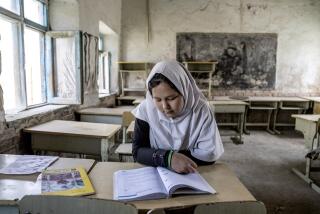Colonel Opens Frontier for Girls
- Share via
MIANWALI, Pakistan — The elders opposed him. Mullahs sowed doubts that he was a true Muslim. Parents fretted that their kids would be corrupted or depraved.
But Altaf Malik, a retired colonel from the Pakistani army, persisted: He wanted to build schools for girls.
“When you educate a male, you educate an individual,” the 67-year-old artilleryman with Lincolnesque whiskers explains. “When you educate a female, you educate a family.”
Thanks to this gentle man’s determination--along with a family trust commemorating his father and contributions from foreign donors--schools for young girls dot some of Pakistan’s harshest territory, the sparsely populated Chakrala Valley.
Malik’s father, a devout Muslim lawyer and social activist who ran an orphanage, made his home here. It was to continue his good works that the son, retired since 1982, hatched his plan. “I thought, female education is the need of the country,” Malik says.
In the arid, sun-blasted landscape east of Mianwali, where virtually no woman knows how to read or write, few agreed. There women have such low status that, at meals, they eat last.
There were public schools, but few girls attended because they would have to walk long distances. They could be raped in the fields, it was said, or, virtually as bad for a family’s repute, rumors could arise that they had been.
Since girls wouldn’t or couldn’t go to school, Malik hit upon the idea of bringing school to them: “I adopted the solution of one room, and one teacher, per hamlet.”
He started in Mianwali, because he thought resistance among townspeople would be lower. The real challenge began when Malik arrived in the farm village of Chhoi, home to 40 families.
Parents there objected that once their daughters knew how to write, they would start penning love letters and having affairs. Many families said they couldn’t afford books, paper and clothes so their daughters could go to school.
Village leaders were hostile. “The parents were told they were working against tradition, that they were spoiling their girls,” Malik said. As for Muslim clerics, “they said: ‘What is the religion of this colonel? What does he want to do with the girls?’ ”
*
Despite such a marked lack of enthusiasm, the first rural girls school opened 2 1/2 years ago in a rude 10-by-15-foot building of adobe, brick and wood. Many in Chhoi were sure that since it was not financed by the government, it would fail.
It might have, had it not been for a local woman who had received enough education at the Pakistani navy’s school in Karachi that she could serve as schoolmistress. More important, the woman, Hamida Noor, was known by villagers, who would not have entrusted their daughters to a stranger.
“It was because of her that the school succeeded,” Malik says.
Slowly, the rolls started to swell. The mood swing in the rocky countryside around Chhoi was gradual but clear. Suspicion of the new gave way to another emotion: jealousy. Why should Chhoi have something they didn’t? people in other hamlets demanded. “So they came to me and asked me to open schools in their settlements,” Altaf said.
His conditions were stiff: “We have no money to spend on buildings. We ask the community to provide the room for the school, and the teacher. The teacher must be one of them, since no one will come to this valley from outside. Then the trust provides the furniture, the learning materials and the teacher’s salary.”
Under Malik’s rules, a settlement must have 30 girls before it merits a school. In April, 1992, one eager villager filled up his truck with girls and drove to Mianwali to show Malik that his hamlet had met the quota.
Malik couldn’t find enough properly trained teachers, so he decided to train them. The trust enlisted village women who had received even a five-year primary education. In a year, Malik maintains, they can be brought up to the same level as teachers in state schools. They earn $17 per month, a fine salary in the Chakrala Valley.
By this April, 40 girls schools should be in operation in the valley thanks to Malik’s persistence. “Every child costs me a rupee a day,” he adds proudly. “This is one-tenth of what it costs the government.”
Education Secretary M. M. Usmani and other officials, astounded by Malik’s ability to mobilize the rural poor, have offered to help him open 60 more schools. UNICEF paid for a learning resource center and a van. In Mianwali, with help from the Canadian and Dutch embassies, Malik is building a library for women and children. “Our women don’t go to general libraries because there are men there,” he notes.
*
The career soldier is brimming with ideas for what has become his second profession. He has begun charging families about 15 cents a month for their daughters’ education, in a view toward making the schools self-supporting.
As part of Malik’s experiments with what is known as “integrated rural development,” each school has been endowed with a tree nursery. The trust has opened its first rural “center,” a walled compound boasting a girls school, medical clinic and workroom for adult women to sew and embroider garments they can sell for a profit.
But it all begins with education. The schools, which cost the trust $33,000 annually to operate, are branching out to teach reading and writing to older girls and a trade to married women. After a difficult start, Malik’s joy is to have made learning a commodity in demand among the peasantry of the Chakrala Valley.
“We’ve taken off,” he says. “Our greatest accomplishment is to have taken the people with us.”
More to Read
Sign up for Essential California
The most important California stories and recommendations in your inbox every morning.
You may occasionally receive promotional content from the Los Angeles Times.













